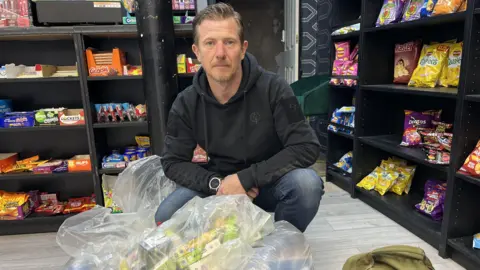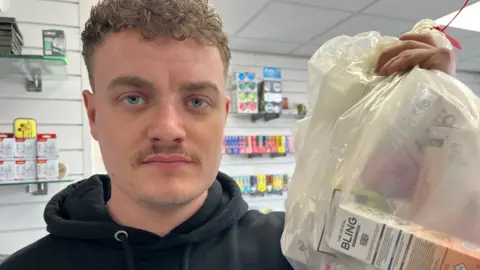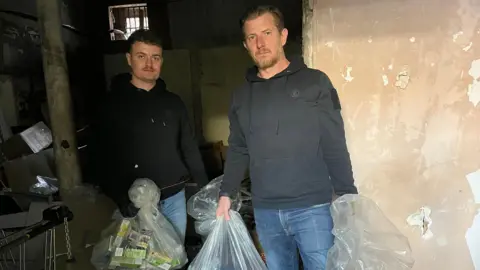BBC News, England
 BBC
BBCMore than six million illegal vaping products have been seized by Trading Standards officers across England in the past three years, new analysis by the BBC has found. We joined one of the teams responsible for tracking down the illicit goods as they prepare for a ban on the sale of single-use disposable vapes.
Paul Leighton is packing his rucksack with a heavy-duty hammer, pry bar and evidence bags for what he describes as “just an average day out”.
As the senior Trading Standards officer at Newcastle City Council, he has learned the hiding places used to conceal illegal vapes can be sophisticated. Sometimes, he has to force his way in.
He has found them hidden everywhere from inside fridges and barbecues to behind fake fuse boxes and tiled panels complete with hydraulic lifts.
“I’ve seen entire kitchens come away from walls and off the floor as well… so all sorts of hiding places,” he says.
Classified as illicit or non-compliant vapes, the products he will be searching for today fail to meet the legal requirements for sale in the UK.
More than six million of them were seized in England between 2022 and 2024, according to analysis by the BBC.
The health risks posed to unwitting customers are summed up by Connor Lamb, a senior technician for licensing also taking part in the unannounced checks on shops.
If you get a normal vape, he says, “they’ve got a capacity which is enough for 600 puffs – the equivalent to 20 cigarettes”.
But if you get an illegal one, “it can be anything from 200 cigarettes in one vape. Obviously someone buying this to go on a night out or a kid might just be chuffing on it all day and you can imagine the drastic effect that’ll have on someone’s lungs.”

According to Trading Standards, illicit or non-compliant vapes can be anything with tank sizes greater than 2ml, a nicotine strength of more than 20ml or labels that do not display manufacturer details and health warnings.
The Medicines and Healthcare Products Regulatory Agency strongly advises consumers not to use them as the true content – and any possible health risk – is unknown.
On the road, Paul and Connor quickly find a stash of between 12 and 20 packs of illegal vapes at the back of a shop counter.
“It would be unusual to have so few in a shop that sells quite frequently like this, so it’s just a case of where they’re hiding the rest,” says Paul.
We head to a room at the back of the shop. There is a stench of urine. It is full of litter and we are deep in seemingly empty cardboard boxes.
Paul’s hunch is proven right though as a search among the rubbish unearths a box of illegal vapes.
How widespread are illegal vapes?
Of 136 local Trading Standards bodies in England, 133 responded to BBC Freedom of Information requests, showing that between 2022 and 2024:
- At least 6,169,822 illicit or non-compliant vaping products were seized, including those taken at ports as well as in shops
- There were 3,766 records of retailers selling vapes to children making test purchases, with some retailers potentially caught more than once
- Retailers were recorded 7,594 times as selling illicit or non-compliant vapes on test purchases
Selling illegal vapes was a factor in at least 316 shop closures during that period, while selling to children was a factor in at least 67. Most of the closures were temporary and some retailers may have been shut down more than once.
The Independent British Vape Trade Association (IBVTA) insists the majority of vape shops operate within the law, serving adults who would otherwise be smoking.
A spokesperson said: “These business owners would never knowingly involve themselves in criminal activity. Rather, it is since the resurgence of popularity of single-use vapes, and therefore a popular ‘cash market’, that we’ve seen organised crime gangs get involved in importing and distributing vapes.”
They said IBVTA had long called for greater enforcement action at borders to stem the flow of illegal products entering the country.

The Department of Health and Social Care said it was allocating an extra £10m this financial year for Trading Standards to tackle underage and illicit sales, with an expected 80 additional apprentice enforcement officers to be funded.
Paul and Connor agree single-use vapes are among the main driving forces of the illegal trade and hope the coming ban will improve the situation.
“These are quite sophisticated networks that we’re up against who are also involved in lots of quite serious activities as well as modern day slavery, trafficking, drug supply,” says Paul.
“I think we’ll see a lot less product taken off the street because we haven’t really had a massive issue with reusable vapes for quite some time.
“They’ve always been broadly compliant in terms of the devices that are being used, the batteries, the liquids, the odd oversized tank here.”
When does the disposable vapes ban start?
From 1 June, it will be illegal for businesses in the UK to sell, supply or possess single-use vapes for sale.
Those caught doing so will get a £200 on-the-spot fine in the first instance, rising to an unlimited fine and/or a prison sentence of up to two years for repeat offences.
The government has said Trading Standards will be able to keep the full value of the on-the-spot fines, to reinvest into enforcement.
Extra enforcement powers and funding are something IBVTA says it welcomes, noting “not all Trading Standards teams are equally or adequately resourced” and “some areas with low regulatory compliance are unable to carry out the enforcement they would want to”.
But a national spokesperson for Trading Standards said its work was “definitely having an impact”.
Government funding had enabled “extra boots on the ground” at Heathrow Airport and Dover Port, the spokesperson said, which explained the high number of seizures by the local authorities home to those border points – Hillingdon and Kent.
In Hillingdon alone, 2,099,248 vaping products were seized between 2022-2024, making up a third of the total.
They said Salford was home to a number of vape warehouses supplying products across England, meaning “seizing at this stage in the supply chain is really effective”.
However, they said there was still a “huge challenge in terms of retailers prepared to sell illegal products as well as those who persistently sell to children”.
Back in Newcastle, Paul offers a similar assessment of the task faced nationally.
He estimates the number of illegal vapes still circulating in the country is “easily in the millions at the moment”, adding: “It’s a constant battle trying to make a difference.”
Additional reporting by Jonathan Fagg and Miguel Roca-Terry








